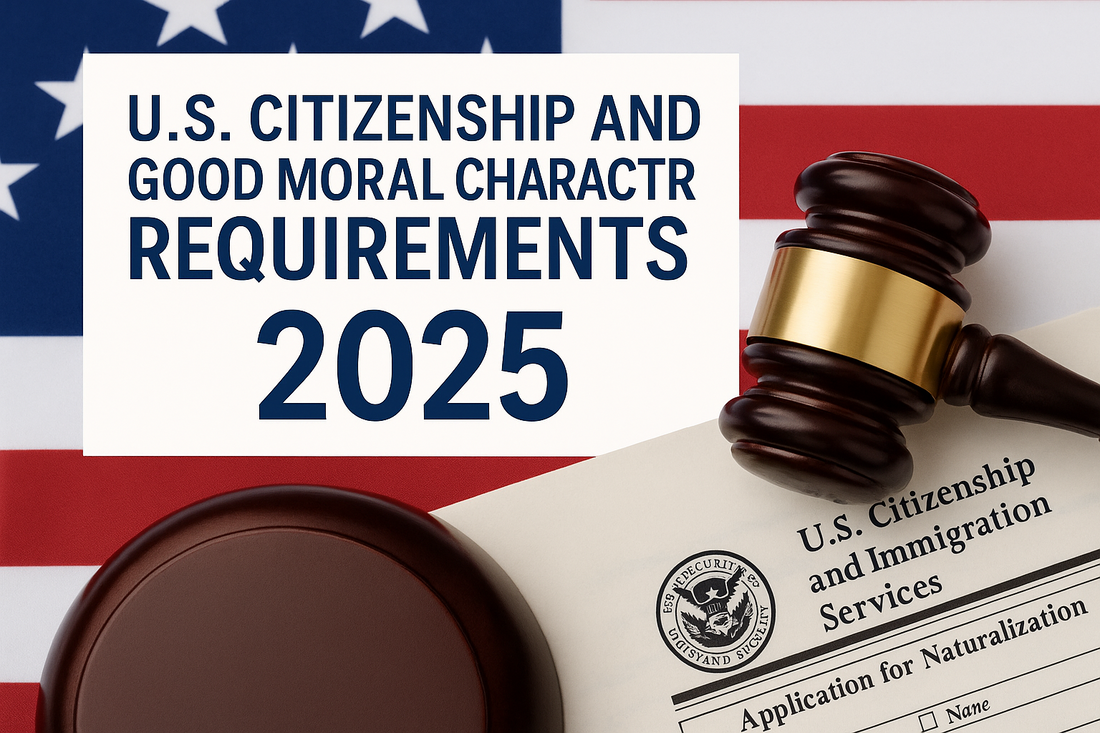
What Are the New U.S. Citizenship Requirements in 2025 Related to “Good Moral Character”?
Share
If you’re thinking about applying for U.S. citizenship in 2025, it is important to understand the new “good moral character” requirements since the U.S. government updated some guidelines this year that could affect your application.
In this blog post, we’ll explain what “good moral character” means, how the rules have changed in 2025, and what you can do to make sure you meet the new requirements. Our goal is to keep it clear, simple, and practical.
What Does “Good Moral Character” Mean for U.S. Citizenship?
To become a naturalized U.S. citizen, you must prove that you have been a person of good moral character for a specific period of time, usually five years (or three years if you’re married to a U.S. citizen).
The U.S. Citizenship and Immigration Services (USCIS) defines “good moral character” as behaving in line with the values and standards of American society, especially obeying the law and avoiding serious misconduct.
Key Updates in 2025 to U.S. Citizenship requirements: What Changed?
In 2025, USCIS updated its Policy Manual to clarify and tighten some of the rules around moral character. Here are the most important changes you should know:
1. Stricter Enforcement of Criminal Offenses
In the past, USCIS would consider certain minor crimes on a case-by-case basis. But starting in 2025, the agency is taking a harder stance on repeat offenses and certain types of crimes, such as:
-
Domestic violence
-
DUI (driving under the influence), especially if repeated
-
Drug-related offenses
-
Theft or fraud
If you’ve been convicted of these offenses, even if they happened years ago, they could now have a stronger impact on your moral character evaluation.
2. Focus on Pattern of Behavior, Not Just One Incident
Previously, an applicant might have been approved if they could show one past issue was isolated and in the distant past. Under the 2025 updates, USCIS now looks more closely at patterns of behavior, even if the offenses were minor.
If you've had multiple arrests or ongoing issues (even if they didn’t result in convictions), it could be seen as a sign of bad moral character.
3. Honesty and Full Disclosure Are More Important Than Ever
Lying or failing to disclose something during your application process can automatically disqualify you from naturalization. In 2025, USCIS made it clear that truthfulness is a key part of good moral character.
If you’re not sure whether something needs to be disclosed, it’s better to talk to an immigration attorney first. It’s much safer to explain a problem than to be caught hiding it.
4. Financial Responsibility Counts
Another area getting more attention in 2025 is financial behavior, including:
-
Failure to pay taxes
-
Failure to support dependents (like child support)
-
Bankruptcy fraud or other financial crimes
USCIS will look at whether you’ve been responsible with your financial obligations. If you owe back taxes, it won’t automatically deny your application, but you’ll need to show you’re on a payment plan or actively working to fix the issue.
How Do You Prove “Good Moral Character”?
Here are some ways to show that you meet the good moral character standard:
- Clean criminal record
- Paying taxes regularly
- Being honest on all immigration forms
- Supporting your children or dependents
- Volunteering or being active in your community
Tip: Even if you’ve had a past issue, submitting letters of recommendation from community leaders, employers, or faith leaders can help support your case.
Who Decides If You Have “Good Moral Character”?
USCIS officers make this decision based on:
-
Your immigration forms (like Form N-400)
-
Your background check
-
Your interview responses
- Any records of criminal or civil violations
Common Reasons for Denial in 2025
With the new guidelines, here are the top reasons someone may be denied based on moral character in 2025:
- Multiple DUIs or drug offenses
- Domestic violence or abuse cases
- Lying on immigration forms or during the interview
- Owing child support without attempting to pay
- Not filing taxes for several years
What If You’ve Had a Problem in the Past?
USCIS considers the whole picture, but these changes may lead to more discretionary denials. If it’s been more than five years since the incident, and you’ve stayed out of trouble since, you may still qualify.
You can also delay applying until you’ve built a stronger record of good moral character. An immigration lawyer can help you decide the best timing.
Need help with your U.S. citizenship application?
The 2025 updates to U.S. citizenship requirements make it clear: Good moral character now requires showing you're a trustworthy, law-abiding member of society. USCIS is paying closer attention to criminal, financial, and behavioral patterns. But with honesty, preparation, and possibly legal support, you can still become a citizen.
We can guide you through the process and help you avoid mistakes that could delay or deny your case.
